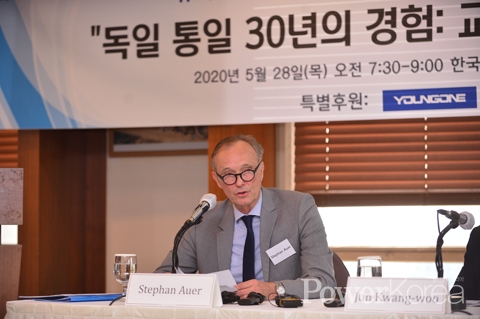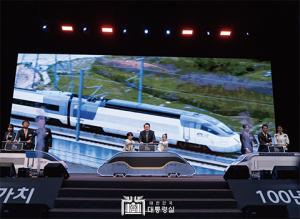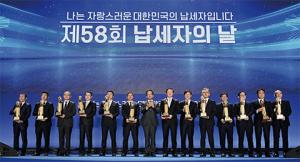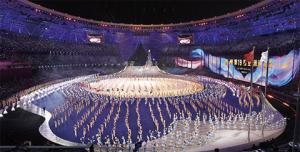 |
||
"Germany and Korea pursue common values and understanding. But most of all, human exchanges are the core of our friendly and friendly relations. The various and sincere exchanges between the two countries always impress me."
The remark is a greeting from Ambassador Stefan Auer, who was posted at the beginning of the official Web site of the German Embassy in Seoul. Speaking at a breakfast lecture hosted by the Institute for Global Economics at the Seoul Press Center downtown Seoul on May 28 morning, Auer stressed that human exchanges between East and West Germany were the basis for achieving German reunification, among other things. It also gave the importance of citizens' desire for unification and civil sentiment for human exchanges, he said.
Citizens' desire for reunification is importantThe 38th parallel line, including the DMZ, must be flexibly crossed by the people of both countries.
Ambassador Auer is drawing keen attention as he suggests that allowing the people of the two countries to flexibly cross the 38th parallel line, including the DMZ, could pave the way for human exchanges, as there is currently no real exchange between the two Koreas on the Korean Peninsula.
This suggests a lot from the Unification Ministry's recent announcement that the South Korean government will revise the "Act on Inter-Korean Exchange and Cooperation" in a way that only reports to the government and does not require "approval" if South Koreans want to meet North Koreans for visits to the North or consultations on inter-Korean exchange and cooperation projects. In response, officials explain that the focus of the law on contact between separated families and North Koreans is shifted from "control" to "open" when a foreign traveler goes to a North Korean restaurant in a third country or encounters a North Korean person accidentally, and when a scholar or researcher makes a one-time contact or contact with a North Korean person for research purposes.
Germany and Korea have many things in common, but we have to face the difference.The goal of the Eastern Policy was to prevent the drift of East-West German relations.
At the lecture, which was attended by about 70 opinion leaders such as Chung-Ang University Professor Ahn Chung-young and Ewha Womans University Professor Yoo Jang-hee including some foreign envoys such as New Zealand Ambassador to Korea Philip Turner, EU Ambassador to Korea Michael Reiterer, Danish Ambassador to Korea Einar Jensen, Auer pointed out that East Germany has never engaged in war and attacked against West Germany and never posed a nuclear threat through nuclear armament. Through this, Germany and South Korea have many things in common, but Auer pointed out the difference between the two Koreas confronting North Korea through nuclear weapons.
What was impressive during Ambassador Auer's lecture was that Prime Minister Billy Brant and others said through Ost-Politik (New Eastern Policy) that West and East Germany, including human exchanges, worked hard to activate human exchanges between the two Germanys and revitalize various channels to faciliate communications. In other words, Ambassador Auer explained that the principle of exchange between East and West Germany was established by the Helsinki Protocol in 1975 and that the goal of the Eastern Policy was to prevent the drift of East-West German relations.
Due to these exchanges, 90 percent of the East German population was able to listen to West German radio before German reunification, and according to 1972 statistics, East Germany was not cut off from the outside world because 70 million people were able to talk by phone between the two Germans.Regarding the aftereffects of Germany unification, Auer expressed concern over the aftereffects, saying, "It is true that the income gap is not constructive for national unity or development, and further pointing out that East Germany has emerged as a strong European country from the past in terms of its manufacturing base or recent IT foundation such as start-ups & fintech etc., but also expressed concern over the aftereffects since Germany reunification.
The income gap between the two Germany and the aftereffects that hinder national development.The hegemony competition between the U.S. and China is not constructive for the world.
It is also a recent view that neighboring countries are taking a view that the reunification of the Korean Peninsula is not in their own interest. In response, Auer pointed out, "As it is true that Korea is in the middle of the U.S.-China hegemony competition, continuing confrontation between China and the U.S. may cause difficulties in unifying the Korean Peninsula, and therefore the U.S.-China hegemony competition is not absolutely a constructive confrontation for the sake of the world."
Recently, on the official Web site of the German Embassy in Seoul, a contribution by German Foreign Minister Heiko Mars to "no politics without history" was published as an opportunity to mark the 75th anniversary of the end of World War II in the form of a joint contribution with Professor Andreas Birsing of the Munich Institute of Modern History, which has developed into an argument that we cannot imagine politics without history.
The belief that war or crimes against humanity should never happen again in German territory is the unshakable core of German foreign policy today. We support strong and integrated Europe, human rights universalized human rights and norms-based international cooperation, and reject Germany's special path, all because we are familiar with Germany's unprecedented crimes in the 20th century, which have emerged in an extremely terrible form of holocaust, German Foreign Minister Heiko Mars notes.So it is time for us Korean people to face up to the situation on the Korean Peninsula, where the recent denuclearization negotiations between the U.S. and North Korea have been stalled and the U.S.-China rivalry for hegemony is accelerating, and find clues to permanent peace and peaceful reunification of the Korean Peninsula.
여홍일 기자 yeo1998@unitel.co.kr







